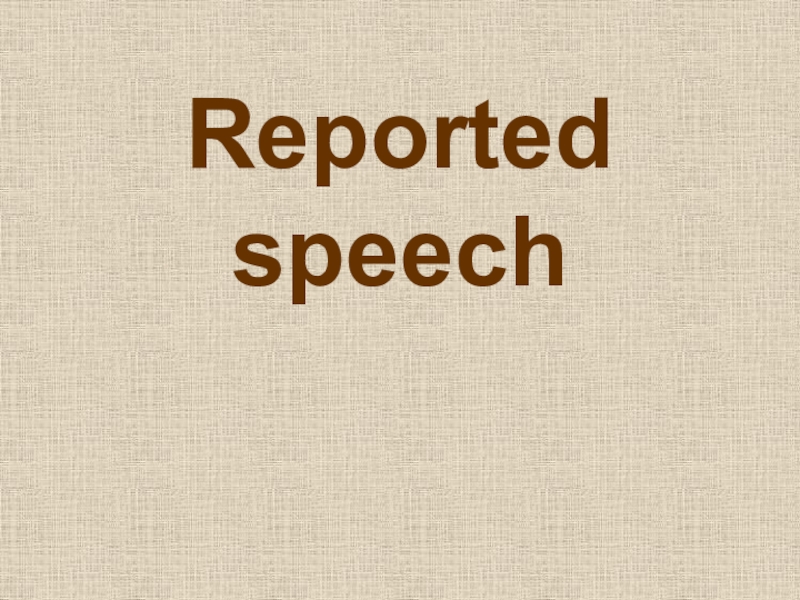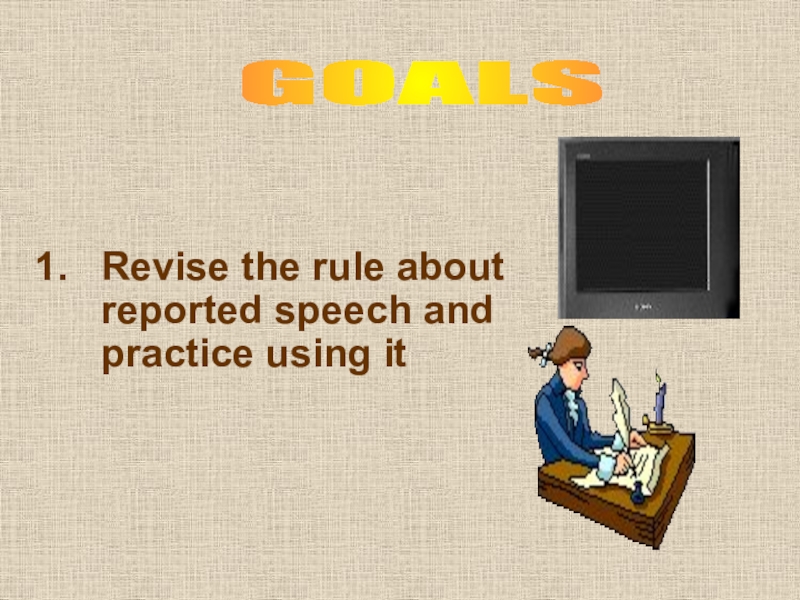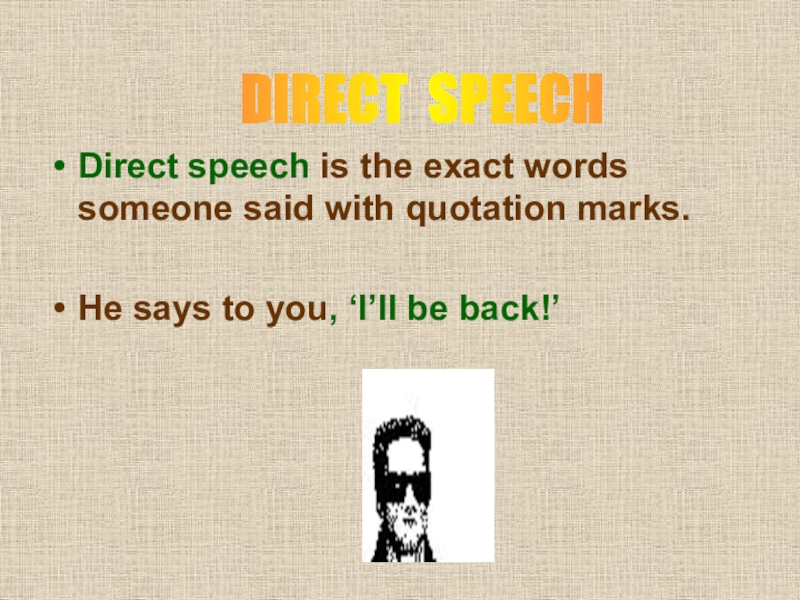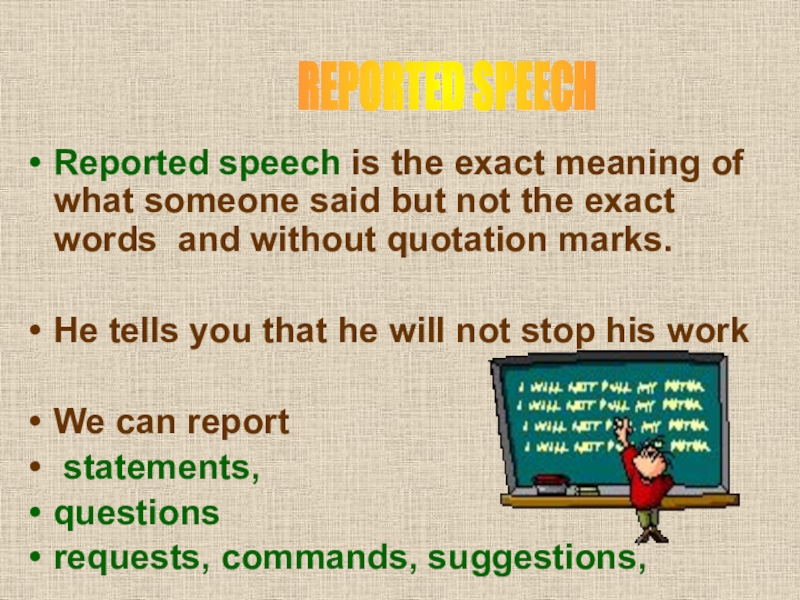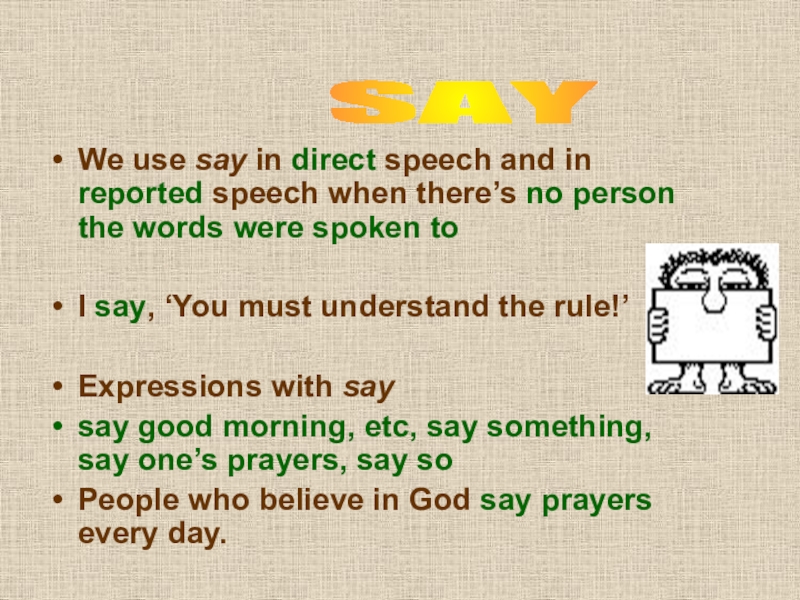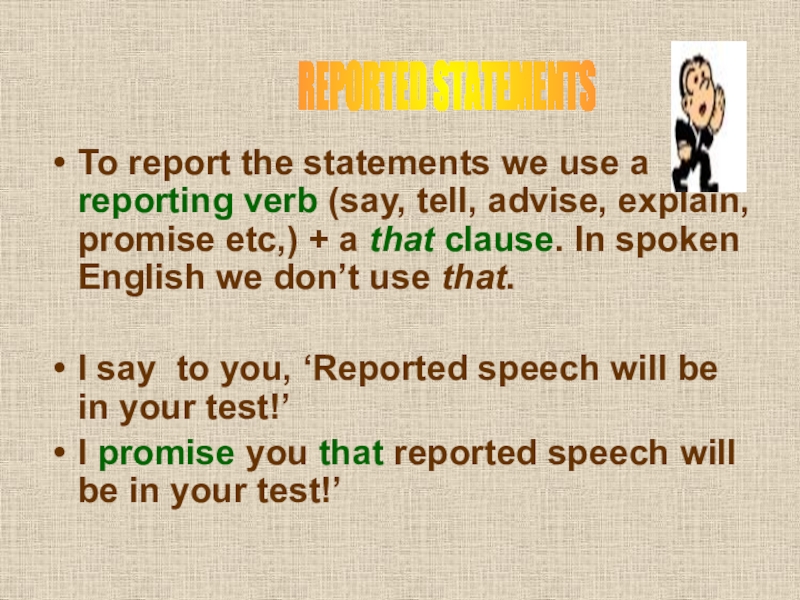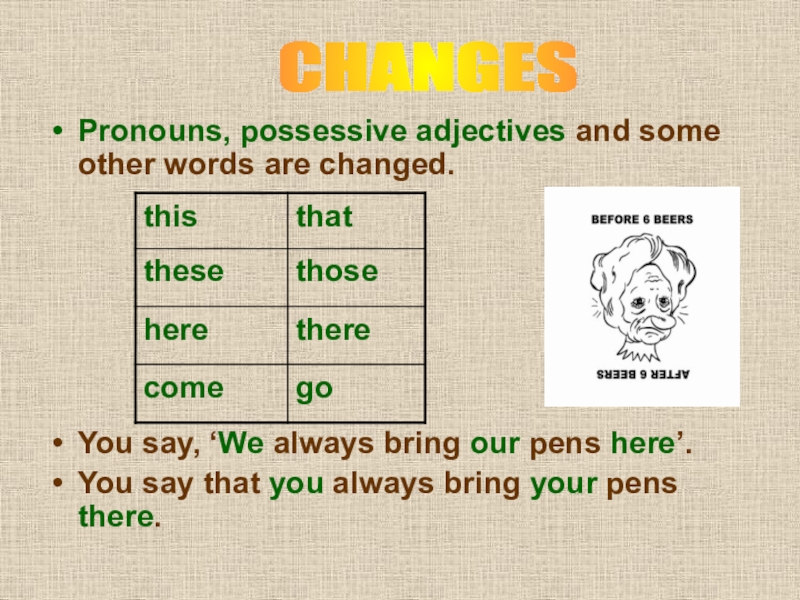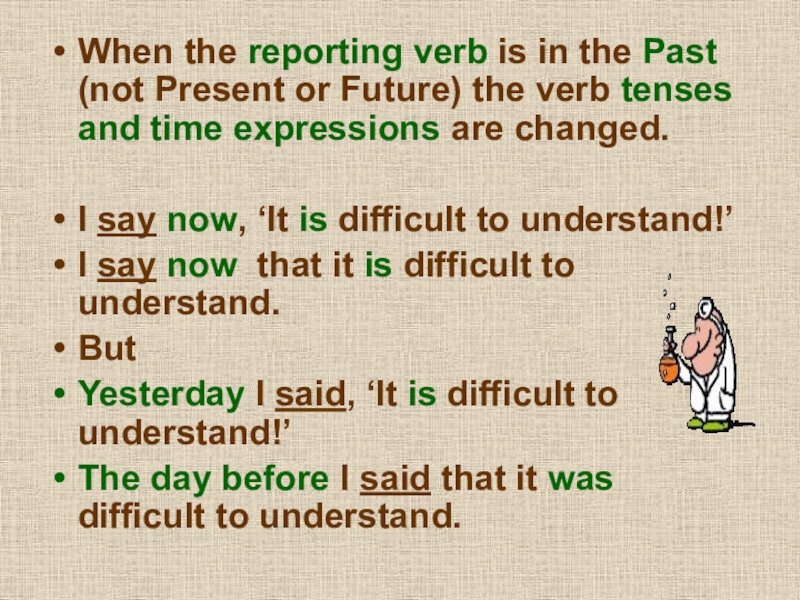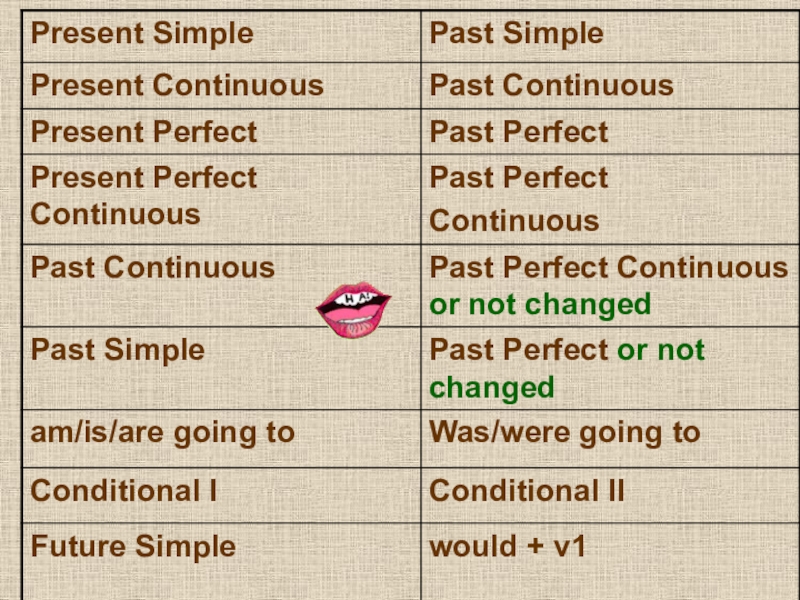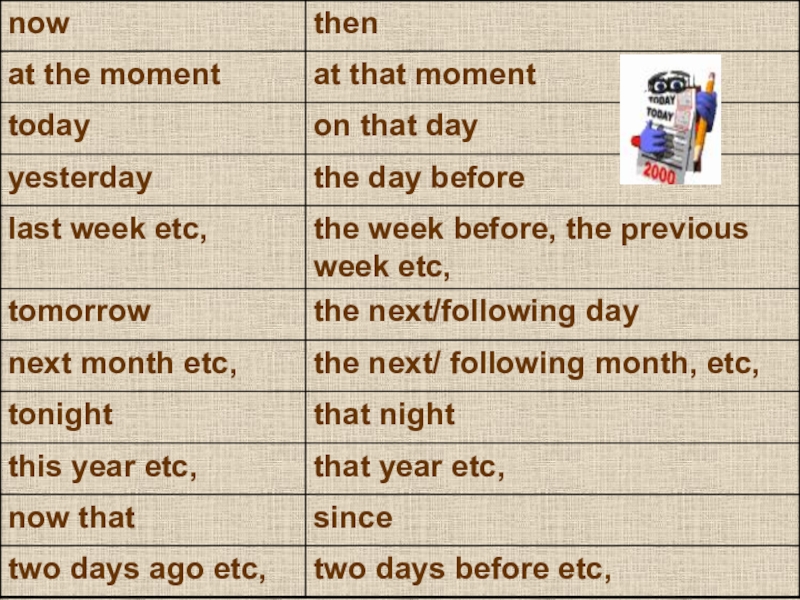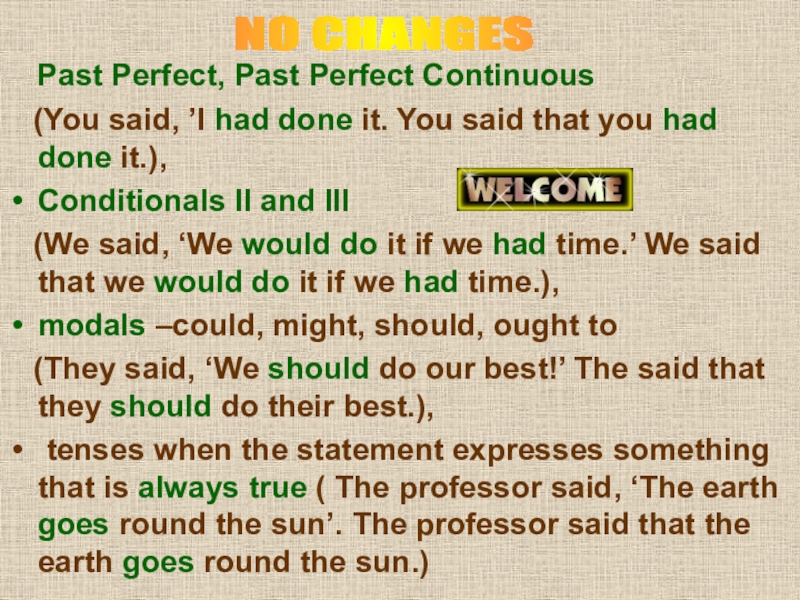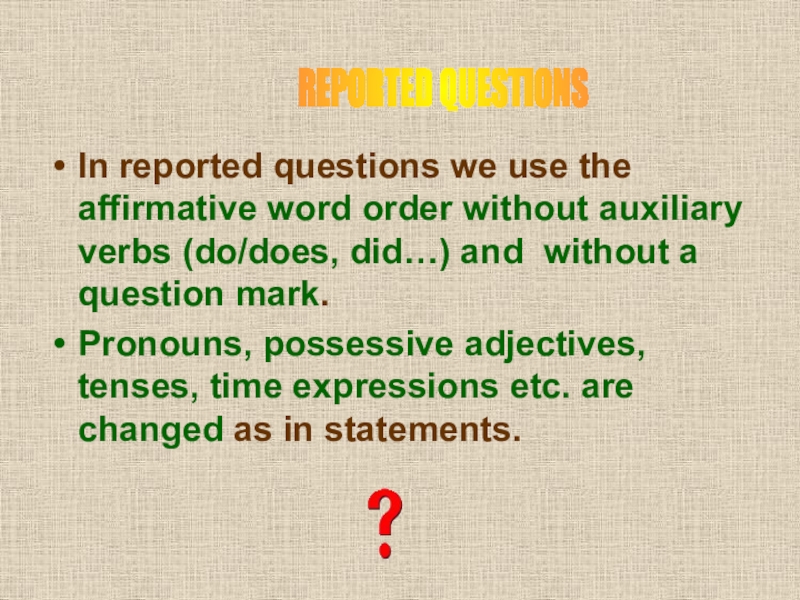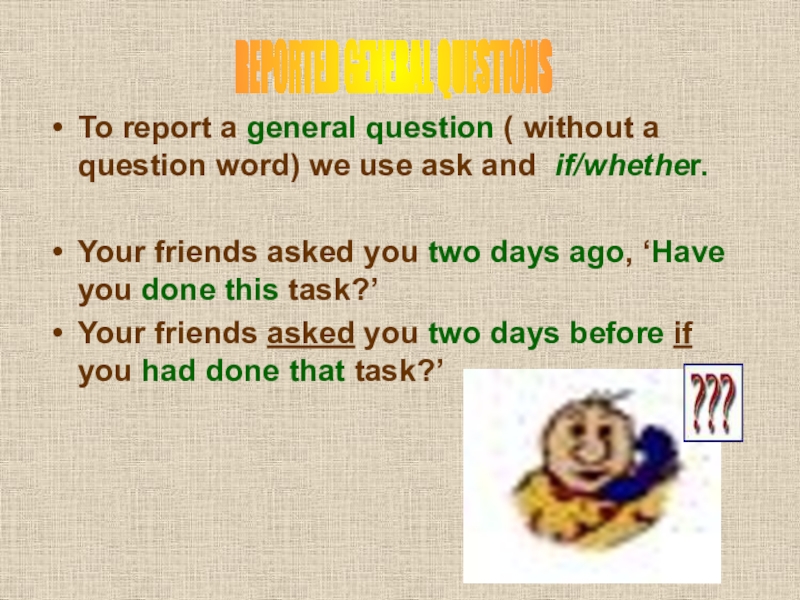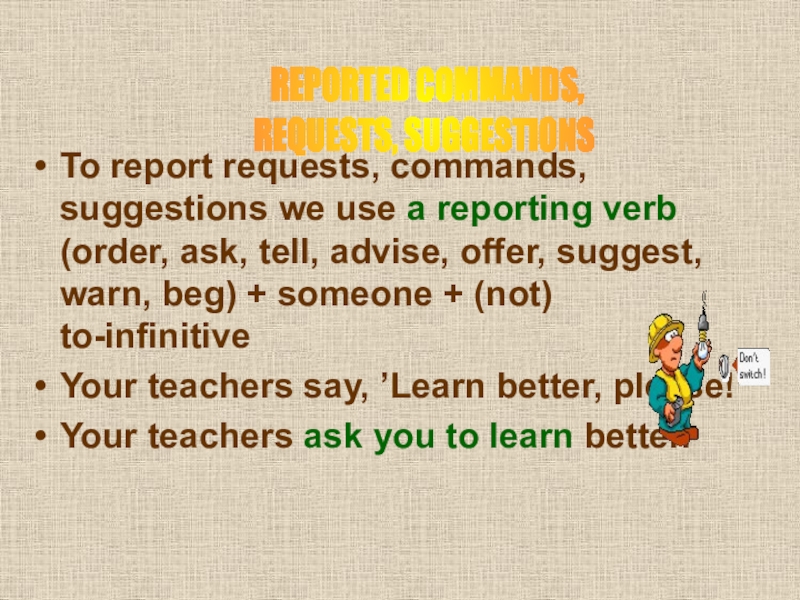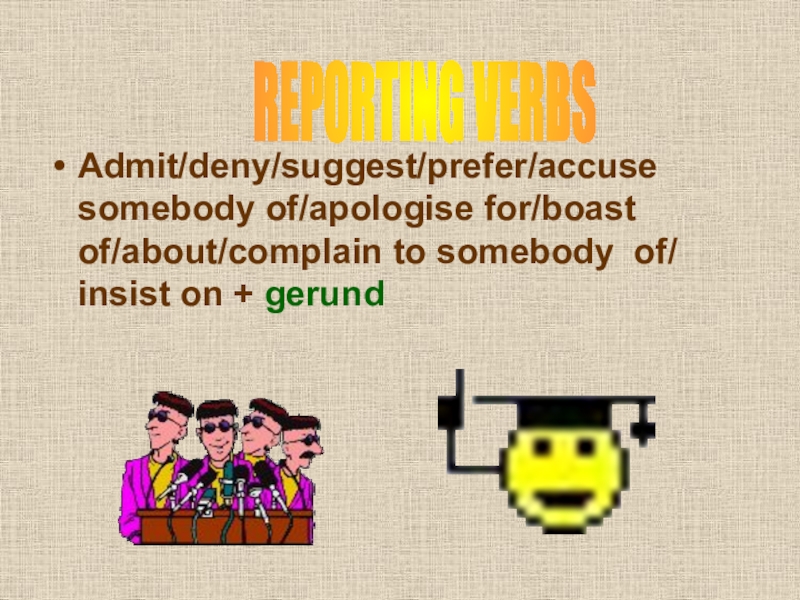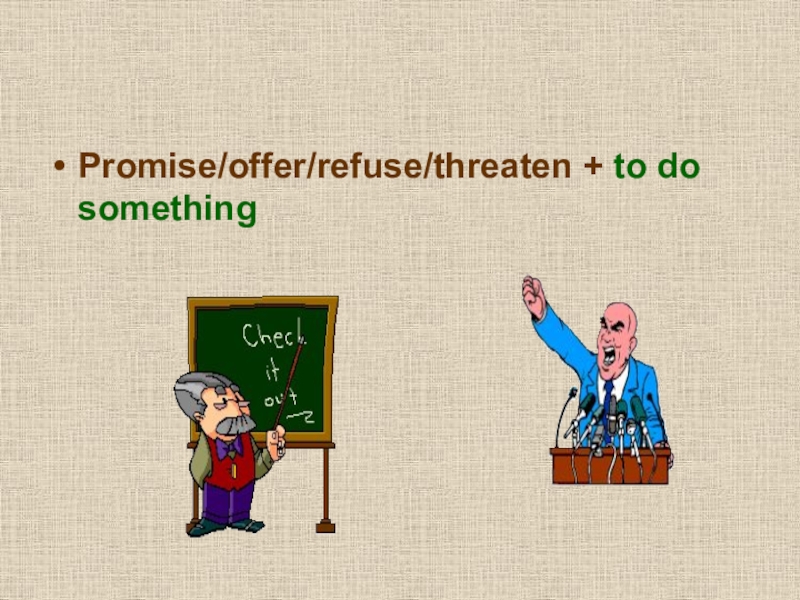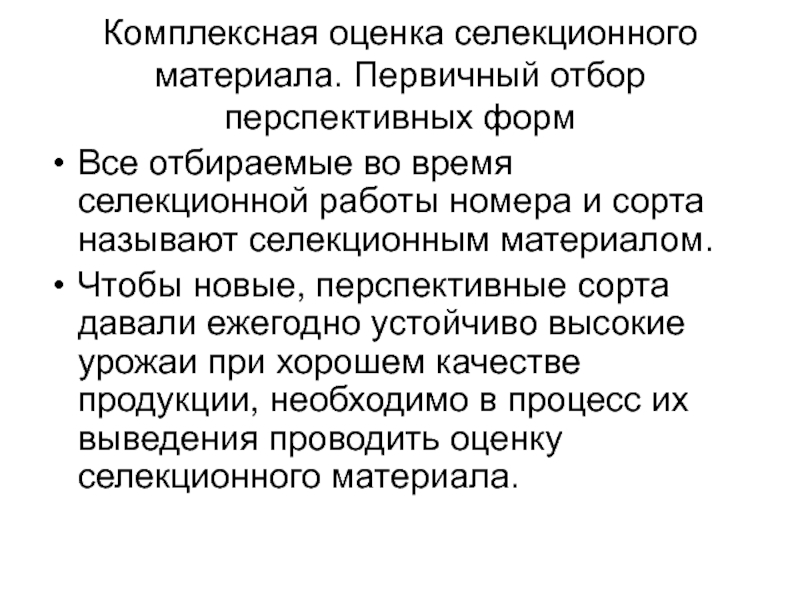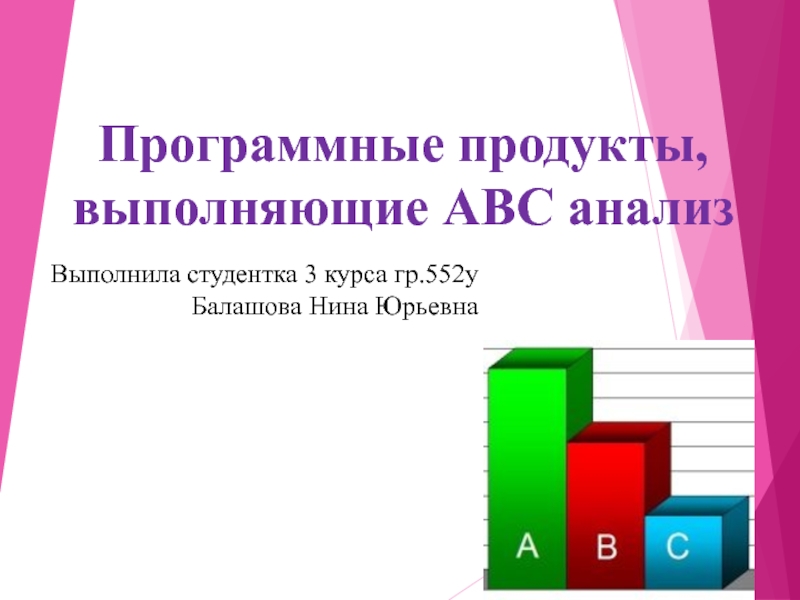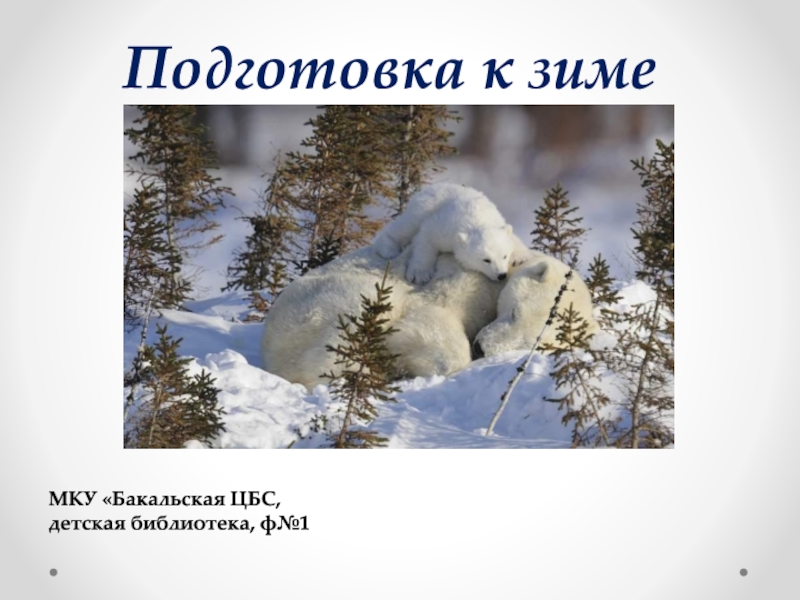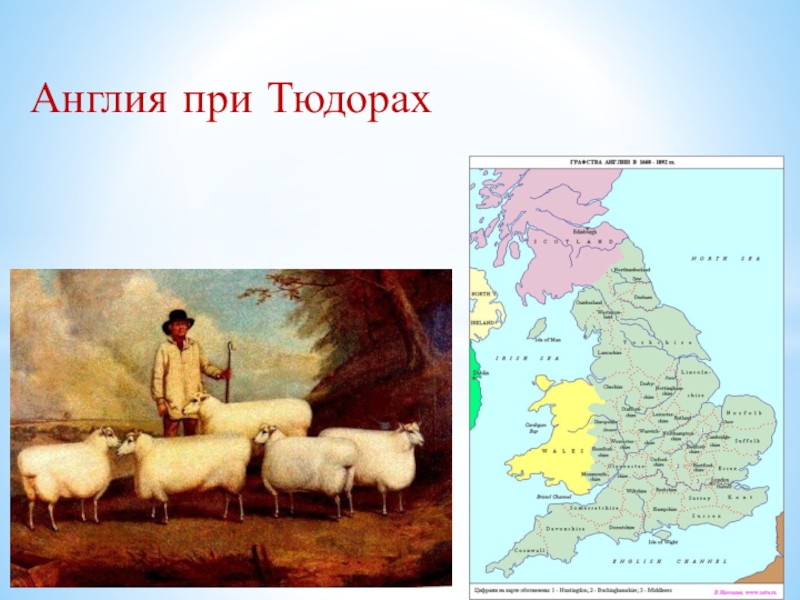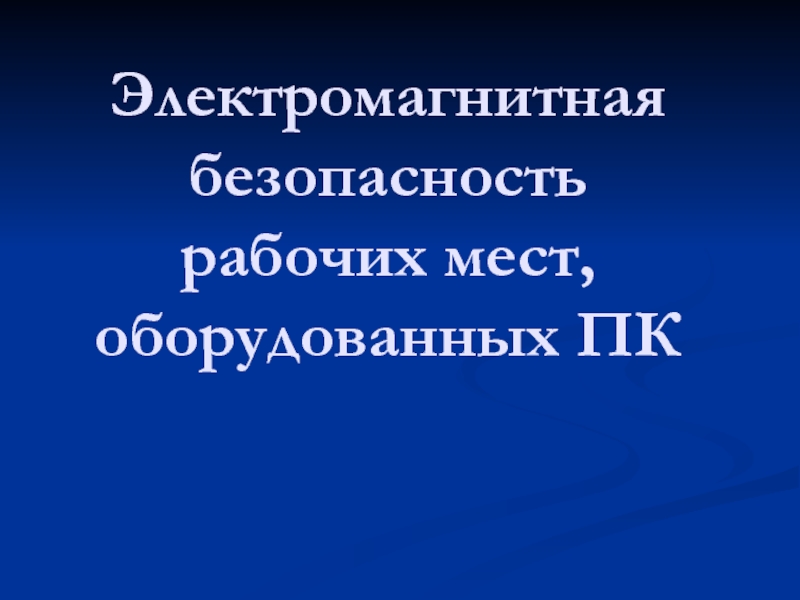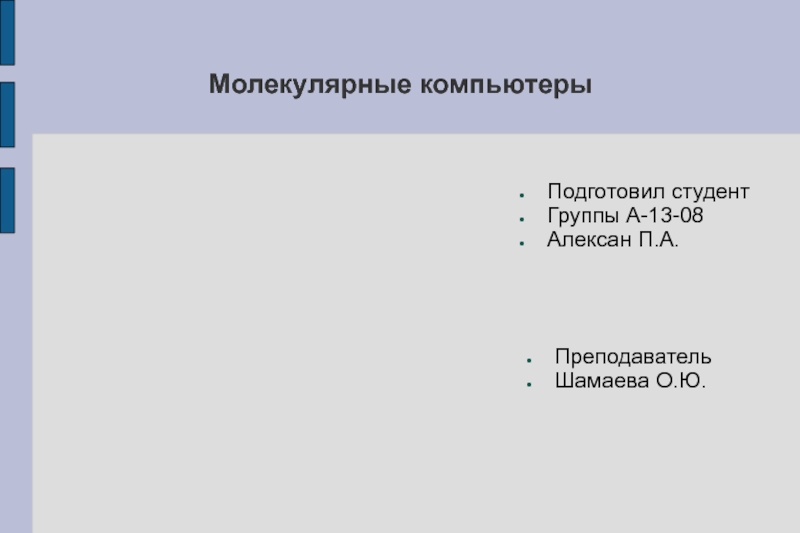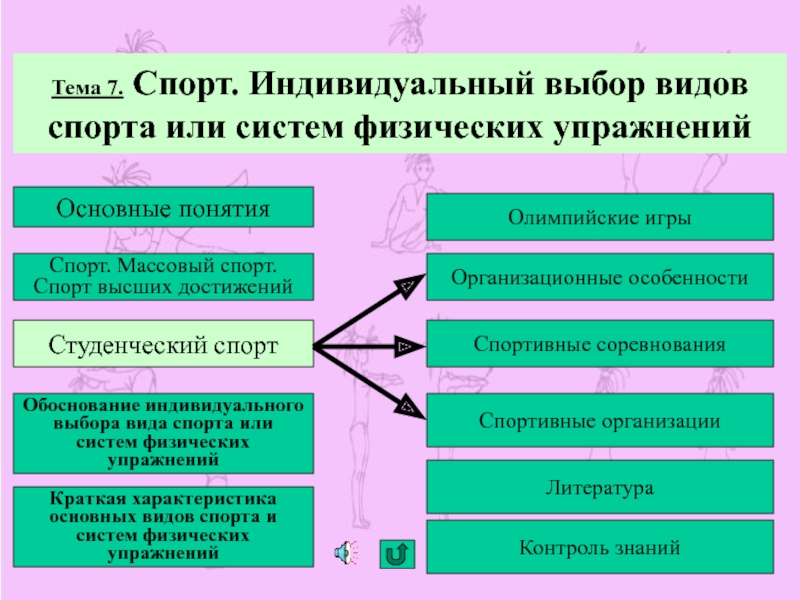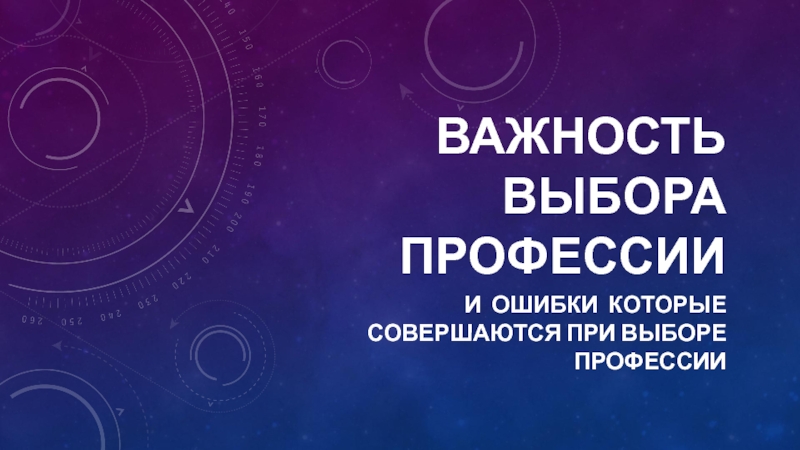Разделы презентаций
- Разное
- Английский язык
- Астрономия
- Алгебра
- Биология
- География
- Геометрия
- Детские презентации
- Информатика
- История
- Литература
- Математика
- Медицина
- Менеджмент
- Музыка
- МХК
- Немецкий язык
- ОБЖ
- Обществознание
- Окружающий мир
- Педагогика
- Русский язык
- Технология
- Физика
- Философия
- Химия
- Шаблоны, картинки для презентаций
- Экология
- Экономика
- Юриспруденция
Reported speech
Содержание
- 1. Reported speech
- 2. Revise the rule about reported speech and practice using itGOALS
- 3. Direct speech is the exact words someone
- 4. Reported speech is the exact meaning of
- 5. We use say in direct speech and
- 6. We use tell in reported speech when
- 7. To report the statements we use a
- 8. Pronouns, possessive adjectives and some other words
- 9. When the reporting verb is in the
- 10. Слайд 10
- 11. Слайд 11
- 12. Past Perfect, Past Perfect Continuous
- 13. In reported questions we use the affirmative
- 14. To report a special (wh-) question, we
- 15. To report a general question ( without
- 16. To report requests, commands, suggestions we use
- 17. Admit/deny/suggest/prefer/accuse somebody of/apologise for/boast of/about/complain to somebody of/ insist on + gerundREPORTING VERBS
- 18. Promise/offer/refuse/threaten + to do something
- 19. Advise/persuade/remind/ask/beg/command/invite/order/remind/warn + somebody to do something
- 20. Скачать презентанцию
Слайды и текст этой презентации
Слайд 4Reported speech is the exact meaning of what someone said
but not the exact words and without quotation marks.
He
tells you that he will not stop his workWe can report
statements,
questions
requests, commands, suggestions,
REPORTED SPEECH
Слайд 5We use say in direct speech and in reported speech
when there’s no person the words were spoken to
I say,
‘You must understand the rule!’Expressions with say
say good morning, etc, say something, say one’s prayers, say so
People who believe in God say prayers every day.
SAY
Слайд 6We use tell in reported speech when there’s a person
the words were spoken to.
I tell you that you must
understand the ruleExpressions with tell
Tell the truth, tell a lie, tell a secret, tell a story, tell the time, tell the difference, tell somebody one’s name, tell sb the way tell one from another
Dishonest people tell a lie instead of telling the truth.
TELL
Слайд 7To report the statements we use a reporting verb (say,
tell, advise, explain, promise etc,) + a that clause. In
spoken English we don’t use that.I say to you, ‘Reported speech will be in your test!’
I promise you that reported speech will be in your test!’
REPORTED STATEMENTS
Слайд 8Pronouns, possessive adjectives and some other words are changed.
You say,
‘We always bring our pens here’.
You say that you always
bring your pens there.CHANGES
Слайд 9When the reporting verb is in the Past (not Present
or Future) the verb tenses and time expressions are changed.
I
say now, ‘It is difficult to understand!’I say now that it is difficult to understand.
But
Yesterday I said, ‘It is difficult to understand!’
The day before I said that it was difficult to understand.
Слайд 12 Past Perfect, Past Perfect Continuous
(You
said, ’I had done it. You said that you had
done it.),Conditionals II and III
(We said, ‘We would do it if we had time.’ We said that we would do it if we had time.),
modals –could, might, should, ought to
(They said, ‘We should do our best!’ The said that they should do their best.),
tenses when the statement expresses something that is always true ( The professor said, ‘The earth goes round the sun’. The professor said that the earth goes round the sun.)
NO CHANGES
Слайд 13In reported questions we use the affirmative word order without
auxiliary verbs (do/does, did…) and without a question mark.
Pronouns, possessive
adjectives, tenses, time expressions etc. are changed as in statements. REPORTED QUESTIONS
Слайд 14To report a special (wh-) question, we use ask with
a question word.
A stranger asked, ’How can I get to
these islands?’A stranger asked how he can get to that place.
REPORTED SPECIAL QUESTIONS
Слайд 15To report a general question ( without a question word)
we use ask and if/whether.
Your friends asked you two days
ago, ‘Have you done this task?’ Your friends asked you two days before if you had done that task?’
REPORTED GENERAL QUESTIONS
Слайд 16To report requests, commands, suggestions we use a reporting verb
(order, ask, tell, advise, offer, suggest, warn, beg) + someone
+ (not) to-infinitiveYour teachers say, ’Learn better, please!’
Your teachers ask you to learn better.
REPORTED COMMANDS,
REQUESTS, SUGGESTIONS
